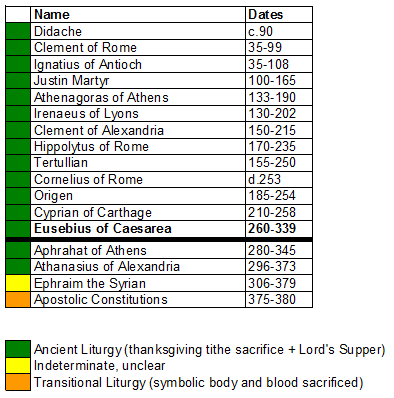The original liturgy:

The Roman liturgy:

Eusebius of Caesarea
Eusebius, as an historian, wrote a lot about what other people had to say. But he also wrote down his own thoughts.
…That they should learn the true ideal of worshipping the Supreme God, and serving Him in every place, according to the prophecy, which says: “And they shall worship Him each from his own place.”Every one, then, whether Greek or Barbarian, is worshipping the Supreme God, not running to lerusalem, nor made holy with bloody sacrifices, but staying at home in his own land, and offering in spirit and in truth [John 4:24] his pure and bloodless offering. And theirs is the new covenant, not according to the old…
Citation: Eusebius. “Proof of the Gospel.” Book 1, §6
…These were Isaiah’s “wonders.”the promise of the anointing with ointment of a good smell, and with myrrh made not to Israel but to all nations. Whence not unnaturally through the chrism of myrrh they gained the name of Christians. But he also prophesies the “wine of joy “to the nations, darkly alluding to the sacrament of the new covenant of Christ, which is now openly celebrated among the nations. And these unembodied and spiritual sacrifices the oracle of the prophet also proclaims, in a certain place:
And again:
And so all these predictions of immemorial prophecy are being fulfilled at this present time through the teaching of our Saviour among all nations. Truth bears witness with the prophetic voice with which God, rejecting the Mosaic sacrifices, foretells that the future lies with us:
We sacrifice, therefore, to Almighty God a sacrifice of praise. We sacrifice the divine and holy and sacred offering. We sacrifice anew according to the new covenant the pure sacrifice. But the sacrifice to God is called “a contrite heart.”
Yes, and we offer the incense of the prophet,
This yet another prophet teaches, who says:
So, then, we sacrifice and offer incense: On the one hand when we celebrate the Memorial of His great Sacrifice according to the Mysteries He delivered to us, and bring to God the Eucharist [thanksgiving] for our salvation with holy hymns and prayers; while on the other we consecrate ourselves to Him alone and to the Word His High Priest, devoted to Him in body and soul. Therefore we are careful to keep our bodies pure and undefiled from all evil, and we bring our hearts purified from every passion and stain of sin, and worship Him with sincere thoughts, real intention, and true beliefs. For these arc more acceptable to Him, so we are taught, than a multitude of sacrifices offered with blood and smoke and fat.
Citation: Eusebius. “Proof of the Gospel.” Book 1, §10
How does Eusebius describe bringing the eucharist—thanksgiving—as an offering to God? By hymns and prayers: a sacrifice of praise. Who does he cite? Malachi. David in the Psalms. Jesus in John.
Eusebius joins the rest of our growing list of patristic writers who saw Malachi’s prophecy as described in Part 8: Interlude as being fulfilled in (2-3) the church’s thanksgiving offering—eucharist—of the sacrifice of prayer, praise, hymns, service, and the giving of tithes: Jesus, John, Justin Martyr, Irenaeus, Tertullian, Origen, Cyprian, Aphrahat, and Athanasius.
Eusebius brings it all as a bloodless sacrifice (see: Part 15: Athenagoras) in spirit and truth: praise, a contrite spirit, a contrite heart, the lifting of hands, thanksgiving (eucharist), hymns, prayers, sincere thoughts, real intention, and true beliefs. He even mentions good works and service elsewhere! All of it, that is, except for the one thing he doesn’t sacrifice: the body and blood of Christ.
When Eusebius here speaks of the Meal, is he referring to the Lord’s Supper or the banquet for the people of God taken out of the tithe offerings, such as that described in Part 2: The Didache? Is the meal a sacrifice or is it a memorial of a sacrifice? Are we bringing to God—offering; sacrificing—the consecrated elements or the thanksgiving? Are we consecrating the elements—bread and wine—for the Lord’s Supper, or are we consecrating ourselves?
The answer to each of those questions is the latter of the two.
As with the other early writers of the church, in Eusebius the Roman liturgy is nowhere to be found. It is probably especially notable that a church historian could find no other liturgy than the ancient one.


Pingback: The Eucharist, Part 8: Interlude
Pingback: The Eucharist, Part 23: Gregory of Nyssa
Pingback: The Eucharist, Part 28: Basil of Caesarea
Pingback: The Eucharist, Part 40: Conclusion